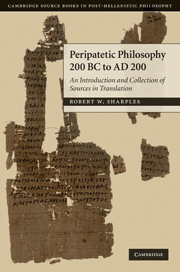Book contents
- Frontmatter
- Contents
- Preface
- Abbreviations
- Introduction
- Individuals
- Logic and ontology
- Ethics
- Physics
- Chapter 19 The nature of time and place
- Chapter 20 The eternity of the world
- Chapter 21 The heavens
- Chapter 22 God and providence
- Chapter 23 Fate, choice and what depends on us
- Chapter 24 Soul
- Chapter 25 Generation
- Chapter 26 Sensation
- Chapter 27 Intellect
- Bibliography
- Index of sources
- Index of passages cited
- Index of personal names (ancient)
- General index
Chapter 23 - Fate, choice and what depends on us
Published online by Cambridge University Press: 05 June 2012
- Frontmatter
- Contents
- Preface
- Abbreviations
- Introduction
- Individuals
- Logic and ontology
- Ethics
- Physics
- Chapter 19 The nature of time and place
- Chapter 20 The eternity of the world
- Chapter 21 The heavens
- Chapter 22 God and providence
- Chapter 23 Fate, choice and what depends on us
- Chapter 24 Soul
- Chapter 25 Generation
- Chapter 26 Sensation
- Chapter 27 Intellect
- Bibliography
- Index of sources
- Index of passages cited
- Index of personal names (ancient)
- General index
Summary
Aëtius 1.29.2 (Dox. 325b5–15)
(1) [Aristotle says] . . . that there are four causes in the whole according to which everything is constituted: intelligence, nature, necessity and chance. And each of these is double, one sort being in human affairs and the other in other things. Some things are fulfilled in every case, others for the most part, others differently at different times. (2) Fate is not a cause, but a manner [tropos] of cause, which attaches in a way to the ordered things that belong to necessity. (Sharples 2007b, 597)
Anonymous, On Aristotle’s Nicomachean Ethics 149.33–150.4
(1) Having said that deliberation is concerned with things that can be done and depend on us–for these alone are left–[Aristotle] added as an indication that of the things mentioned the cause of some is nature, of others necessity, of others chance (placing the spontaneous too under chance), and of others intelligence. These are the things that come about through a human being and have a human being as their origin; and for this reason they are also up to us. (2) Fate too would be said to be placed under nature according to these men. For what is fated is neither inevitable nor necessary. (Sharples 2007b, 596)
- Type
- Chapter
- Information
- Peripatetic Philosophy, 200 BC to AD 200An Introduction and Collection of Sources in Translation, pp. 211 - 234Publisher: Cambridge University PressPrint publication year: 2010



